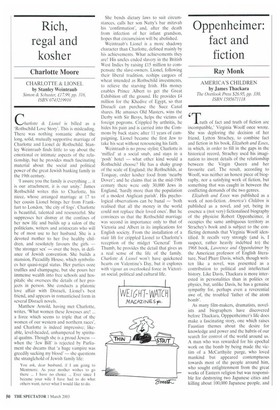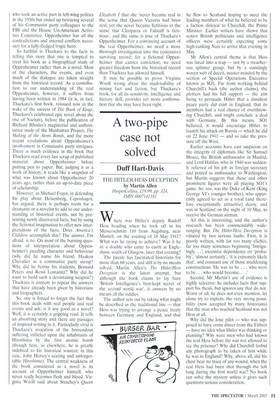Oppenheimer: fact and fiction
Ray Monk
AMERICA'S CHILDREN by James Thackara
The Overlook Press $26.95, pp. 330, ISBN 1585671118
Truth of fact and truth of fiction are incompatible,' Virginia Woolf once wrote. She was deploring the decision of her friend, Lytton Strachey, to combine fact and fiction in his book, Elizabeth and Essex, in which, in order to fill in the gaps in the historical record, Strachey used his imagination to invent details of the relationship between the Virgin Queen and her favourite earl. The result, according to Woolf, was neither an honest piece of biography, nor a satisfying work of fiction, but something that was caught in between the conflicting demands of the two genres.
Elizabeth and Essex was published as a work of non-fiction. America's Children is published as a novel, and yet, being in essence a (not very) fictionalised biography of the physicist Robert Oppenheimer, it occupies the same ambiguous territory as Strachey's book and is subject to the conflicting demands that Virginia Woolf identified. It recalls very strongly (and is, I suspect, rather heavily indebted to) the 1968 book, Lawrence and Oppenheimer by the American professor of English literature, Nuel Pharr Davis, which, though written like a novel, was presented as a contribution to political and intellectual history. Like Davis, Thackara is more interested in personalities than in politics or physics, but, unlike Davis, he has a genuine sympathy for, perhaps even a reverential awe of, the troubled 'father of the atom bomb'.
As many film-makers, dramatists, novelists and biographers have discovered before Thackara, Opppenheimer's life does make a fascinating story, one which raises Faustian themes about the desire for knowledge and power and the hubris of our search for control of the world around us. A man who was rewarded for his epochal work on the bomb by being made the victim of a MeCarthyite purge, who loved mankind but appeared contemptuous towards most of the people around him, who sought enlightenment from the great works of Eastern religion but was responsible for destroying two Japanese cities and killing about 100,000 Japanese people, and who took an active part in left-wing politics in the 1930s but ended up betraying several of his Communist party colleagues to the FBI and the House Un-American Activities Committee. Oppenheimer has all the contradictions and internal conflicts necessary for a fully-fledged tragic hero.
So faithful is Thackara to the facts in telling this story that one is tempted to treat his book as a biographical study of Oppenheimer rather than as a novel. Most of the characters, the events, and even much of the dialogue are taken straight from the historical record. As a contribution to our understanding of the real Oppenheimer, however, it suffers from having been written in 1984 (it is, in fact, Thackara's first book, reissued now in the wake of the success of The Book of Kings, Thackara's celebrated epic novel about the rise of Nazism), before the publication of Richard Rhodes's magisterial and authoritative study of the Manhattan Project, The Making of the Atom Bomb, and the more recent revelations about Oppenheimer's involvement in Communist party intrigues. There is much evidence in the book that Thackara read every last scrap of published material about Oppenheimer before putting pen to paper. But, judging it as a work of history, it reads like a snapshot of what was known about Oppenheimer 20 years ago, rather than an up-to-date piece of scholarship.
However, as Michael Frayn, in defending his play about Heisenberg, Copenhagen, has argued, there is perhaps room for a dramatist or a novelist to add to our understanding of historical events, not by presenting newly discovered facts, but by using the fictional imagination to offer new interpretations of the facts. Does America's Children accomplish this? The answer, I'm afraid, is no. On most of the burning questions of interpretation about Oppenheimer's puzzling character and behaviour (why did he name his friend, Haakon Chevalier as a communist party snoop? Why did he betray his students, Bernard Peters and Rossi Lomanitz? Why did he want to build such a devastating weapon?) Thackara is content to repeat the answers that have already been given by historians and biographers.
So, one is forced to forget the fact that this book deals with real people and real events and ask: is it any good as a novel? Well, it is certainly a gripping read. It tells an absorbing story and there are passages of inspired writing in it. Particularly vivid is Thackara's evocation of the horrendous suffering inflicted upon the inhabitants of Hiroshima by the first atomic bomb (though here, as elsewhere, he is greatly indebted to his historical sources; in this case, John Hersey's searing and unforgettable Hiroshima). The central weakness of the book considered as a novel is its account of Oppenheimer himself, who never really becomes flesh and blood. Virginia Woolf said about Strachey's Queen Elizabeth I that she 'never became real in the sense that Queen Victoria had been real, yet she never became fictitious in the sense that Cleopatra or Falstaff is fictitious', and the same is true of Thackara's Oppenheimer. For a convincing account of the real Oppenheimer, we need a more thorough investigation into the (extensive) surviving record; for a fictional Oppenheimer that carries conviction, we need greater freedom from the historical record than Thackara has allowed himself.
It may be possible to prove Virginia Woolf wrong about the inadvisability of mixing fact and fiction, but Thackara's book, for all its sensitivity, intelligence and literary skill, provides yet more confirmation that she may have been right.



















































































 Previous page
Previous page